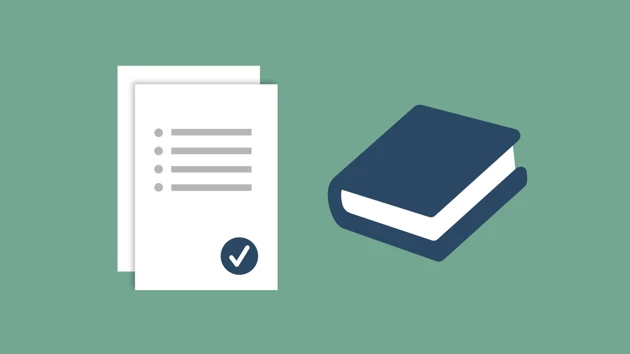Describe in a way that allows others to understand your research
When you describe research data in a repository, you enable others to understand the context of the research you have conducted. In this way, other researchers can build on your work and conduct similar studies, even when the research data are not freely available.
Data that describe research data
Research data are described using metadata (data about data), such as when explaining how the research data was collected. A detailed metadata description could include information on the following parts:
Content and structure
Information that describes the content of the research data. This can be
- keywords;
- summary or abstract;
- table of contents; and
- relationships between materials and data that build on each other, for example code keys and databases.
Origin
Metadata that describe the creators of the research data. For example, information on
- creators or authors;
- higher education institution or research accountable authority;
- research infrastructures;
- collaborations;
- contact details; and
- funding bodies.
Generation
Metadata that provides information about and describes the generation and sources of research data. For example, information on
- collection methods;
- processes;
- data sources;
- context, or factors that may have influenced the outcome;
- time point when the data were created and last updated; and
- other utilised data sources.
Administrative information, access and restrictions
Administrative and technical metadata contain information about access to research data, such as information on
- time point when the metadata were created and last updated;
- rights and licenses;
- access to the material and how access requests are made; and
- technical access.
Document data from the beginning
You can save a lot of time if you establish good file organisation practices even before data collection begins.
Organising data when you research
Use a metadata standard
A metadata standard helps you describe research data in an unambiguous way, making the data searchable by both people and machines. For example, you can often choose keywords from controlled vocabularies. Your chosen metadata standard may also have rules for how different types of metadata are related. There are many different metadata standards that are adapted to the needs of different research fields.
You can benefit greatly from considering from the very beginning which metadata standard you are likely to use. Your metadata standard can show what information will be needed so that you can continuously collect, document and compile the information for metadata.
Metadata in SND’s Doris
When you use SND’s tool Doris to describe research data through the Researchdata.se portal, there are predefined fields for metadata. These are based on the metadata standard Data Documentation Initiative (DDI).
Additional metadata standards in Doris
To make it easier for researchers from different subject areas to describe their data, there are subject-specific metadata profiles in Doris. These subject profiles are based on SND’s general profile but may have other metadata fields that better capture the research subject in question. SND has metadata profiles in the following subjects:
- agricultural sciences;
- medical and health sciences;
- natural sciences;
- social sciences;
- engineering and technology;
- veterinary science;
- history and archaeology;
- earth and related environmental sciences; and
- language resources.
A metadata profile for the humanities and arts is currently in development.
Read more about describing research data in Doris (snd.se)
Additional metadata standards
There are also other resources for finding a metadata standard that is suitable for your field of research.
A selection of resources for metadata standards
- List of metadata standards and types sorted by research field from the Digital Curation Centre, DCC:
Disciplinary Metadata (DCC) - Research Data Alliance’s open collaboration to produce a metadata directory on GitHub:
RDA Metadata Directory - Dublin Core is a well-established metadata standard that is suitable for most research domains. It is also designed to support metadata descriptions of interdisciplinary resources:
Dublin Core
Describing research data with sensitive information
Research data that contain personal data or information classified as secret may not be published open access. However, you can publish descriptions of such research data in an open repository. When doing so, you need to be careful about how you design the metadata so that it cannot be used to identify the original information or a specific individual.
You do not need to inform the research subjects that you are publishing descriptions of research data that contain personal data, as this is not considered personal data processing.
Read more about research data with high protection value
Prepare data for publication
When publishing research data in a repository, there are a few things to consider for ensuring your data are sustainable in the long term.
- Use appropriate file formats to enable future use.
- Make sure your data are documented clearly so that others can interpret them.
- You can only publish stable datasets where processing is complete.
More information about how to prepare data for publication is available here:
Ready to deposit your data? (Oxford University)
File formats (Researchdata.se)
Share data according to the FAIR principles
The FAIR principles describe key guidelines for data management. To comply with the FAIR principles, it is important that you describe research data clearly and machine-readably and that you publish the description in an open repository. If access to data is restricted in any way, state this in the description.
More information about sharing research data
Complying with the FAIR principle of “findable” involves attaching a unique persistent identifier to the data. With research data, a Digital Object Identifier (DOI) is often used.
Read more about the FAIR principles on researchdata.se
Do you have questions about research data?
The University has a cross-functional team that supports you with research data issues in areas such as archiving, legal affairs, IT support, open data, and information security. You can contact the research data support team using the following form:
Contact the research data support team if you have questions


